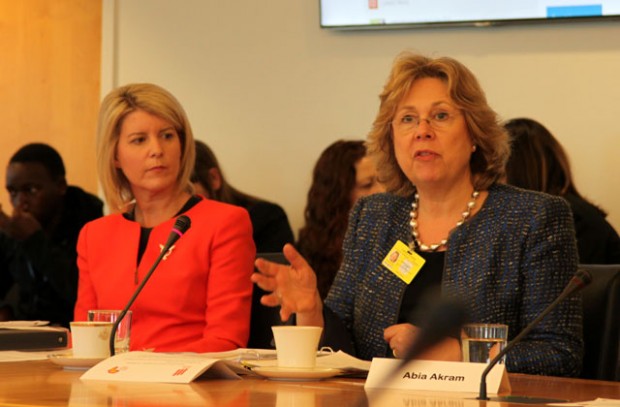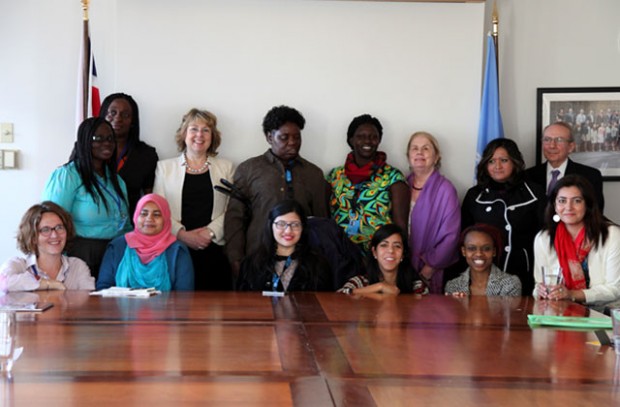Women with disabilities often face double discrimination – because they are female, and because they have disabilities. If they are from a minority group, elderly, or are gay, they may face multiple discrimination.
But this discrimination can become still worse in a humanitarian or conflict emergency.
Increased violence is a critical risk for girls and women in emergencies, and even more so for those with disabilities. This week, at the UN Commission on the Status of Women in New York, I heard about one Ugandan woman with albinism who was raped 4 times by 4 separate men, resulting in 4 children.
And when they do experience violence, many girls and women with disabilities may have been separated from their families and communities, who may also assume they are dead, and they do not have access to support, justice and assistance.
The most vulnerable and marginalised in society are also those most likely to be overlooked in relief efforts. This is both because those efforts are inaccessible to people with disabilities, and due to a lack of understanding of people’s needs.
The UK government’s ambitious new framework on disability and development has a particular focus on including people with disabilities in our response in humanitarian situations.
This week, I have been able to meet groups here at the Commission on the Status of Women whose insights are invaluable as we seek to understand the particular needs of women and girls with disabilities, so that we can all influence the international community to do more.

One event which focused on the particular needs of women with disabilities in conflict, hosted by the Australian government, brought together national and international disability organisations and activists, governments and UN organisations. The Australians have led the way on including disability in their approach to development, and I was very impressed by what I heard from them.
As we seek to work with others to ensure that internationally this work is taken forward, I’ll be meeting Judy Heumann, the US Special Adviser on disability rights. The US development department, USAID, has had a disability policy since 1997 – so I’m interested to know whether disability inclusion runs through all of USAID’s thinking, what the biggest challenges are, and what’s working well.
I also met a group of women with disabilities from Zimbabwe, Kenya, Uganda, Ghana, Mexico and Pakistan along with Handicap International to hear what they think our priorities should be, and to seek to understand better the experience of women with disabilities.

And I expect to learn a lot – as I did this week from a Pakistani disability activist. She told the story of disabled women in a mountainous region who were provided with wheelchairs in an effort to improve their lives. The wheelchairs were then nowhere to be seen. And the reason? The wheelchairs weren’t in any way appropriate to the area in which they lived. They sold the wheelchairs for what were really useful – mules. Needless to say, the women were not consulted on what would best help them.
I will also be meeting the International Disability Alliance, the global network of disabled people’s organisations. Almost all progress in disability rights and improvements for people with disabilities has been driven by national and international disability movements. Increasing the voice and capacity of disabled people’s organisations to lobby their governments to ratify and implement the UN Convention on the Rights of Persons with Disabilities is essential. DFID supports over 400 disabled people’s organisations in developing countries, and aims to strengthen the participation of people with disabilities in the decisions that affect their lives.
The UK government is also thinking about how to lock in progress on disability in the long term, by ensuring that disability is fully addressed in the goals that will replace the Millennium Development Goals this year. We are fighting to make sure that we include people with disabilities – that this time we ‘leave no one behind’.
Getting the data and statistics on disability in order is critical for the goals that will replace the Millennium Development Goals this year. We need to understand who is being left behind, and to have the information to target and tackle this, and to track progress. So I will meet the UN Statistics Division to seek to understand how they are supporting a stronger approach to gender and disability data, and how they are supporting the capacity of member states in the generation and use of statistics.
As we move towards a new set of development goals, it essential that this time they are inclusive. The better we understand what this really means, the better we will be able to ensure that this is so.
Sign up for email updates from this blog, or follow Lindsay on Twitter.


1 comment
Comment by Wiiliam Dunn posted on
All this sounds just great, except one thing - yes, there are particular countries where woman+disability is a huge problem, or if you're simply a woman, even without disability, and there must be done something about it. But FIRST there must be done something about the rejecting of women as equal and worthy part of the society. If you have this major hold-back, then you can't do much about anything else, concerning women and their rights....